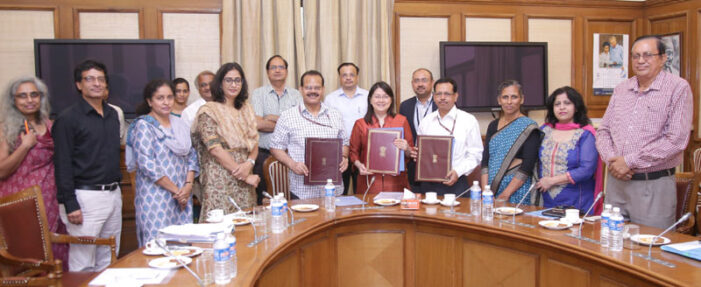The Asian Development Bank (ADB) and the Government of India signed in New Delhi $375 million in loans and grants to develop 800-kilometer Visakhapatnam-Chennai Industrial Corridor, which is the First Phase of a planned 2,500–kilometer long East Coast Economic Corridor (ECEC).
The Corridor is expected to spur development on India’s eastern coast in line with the Government of India’s Make in India policy to stimulate manufacturing, and Act East policy to integrate the Indian economy with Asia’s dynamic global production networks.
ADB approved $631 million in loans and grants in September 2016 to develop the Visakhapatnam-Chennai Industrial Corridor and approved loans comprise a $500 million multi-tranche facility to build key infrastructure in the four main centers along the corridor – Visakhapatnam, Kakinada, Amaravati, and Yerpedu-Srikalahasti in the State of Andhra Pradesh.
The First Tranche of $245 million was signed on Tuesday, February 28, 2017 that will finance sub-projects to develop high-quality internal infrastructure in 2 of the 4 nodes of the corridor–Visakhapatnam and Yerpedu-Srikalahasti.
Another component of the approved ADB funds signed on 23.02.2017 was a $125 million policy-based loan that will be used for capacity development of institutions engaged in corridor management, provide support to enhance ease of doing business and for supporting industrial and sector policies to stimulate industrial development.
“ADB is supporting an industrial corridor development approach that involves creation of efficient transport, and reliable water and power supplies in the industrial clusters along with a skilled workforce, to be backed by industry-friendly policies that improve ease of doing business for integration of local economy with global production networks,” said L. B. Sondjaja, Deputy Country Director of ADB’s India Resident Mission.
“We estimate that by 2025, annual industrial output along the corridor will increase fourfold to $64 billion from about $16 billion in 2015 if investment opportunities are maximized over the next few years,” he added.
The project is an important milestone in the process of developing the corridor and realizing the objectives of Make in India. We sincerely hope that the project will complement the ongoing efforts of the Government of Andhra Pradesh to enhance industrial growth and create high-quality jobs,” said Raj Kumar, Joint Secretary (Multilateral Institutions), in the Ministry of Finance, who signed the loan agreement for Government of India.
The project agreement was also signed by Hema Munivenkatappa, Special Secretary to Government (Finance) on behalf of the Government of Andhra Pradesh.
Along with the ADB loans, agreement was also signed for a $5 million grant from the multi-donor Urban Climate Change Resilience Trust Fund that is managed by ADB to build climate change resilient infrastructure. The Government of India will provide extra funding of $215 million to the $846 million project.
Among the outputs envisaged under the $245 million tranche 1 loan include strengthening and widening of a 29.6-kilometer section of state highway to four lanes to improve connectivity from Kakinada Port to National Highway 16, investments in smart water management in Visakhapatnam to reduce nonrevenue water and provide continuous water supply, upgrading 7 power substations to supply high-quality and reliable power supply to Visakhapatnam, Naidupeta, and Yerpedu-Srikalahasti industrial clusters, and effluent treatment facility in Atchutapuram and Naidupeta clusters.
The tranche 1 loan will have a 25-year term, including a grace period of 5 years, a 20-year straight line repayment method at an annual interest rate determined in accordance with ADB’s LIBOR-based lending facility.

